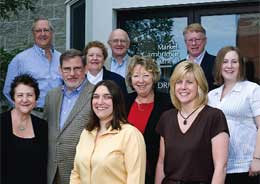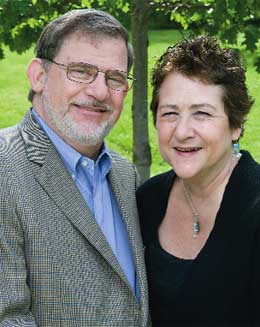|
Advising the advisors
Markel Cambridge Alliance focuses solely on E&O for financial planners
By Phil Zinkewicz
In December of last year, Bernard Madoff was arrested and pled guilty to an 11-count criminal complaint, admitting to defrauding thousands of investors of billions of dollars. He was later convicted of operating a Ponzi scheme that has been called the largest investor fraud ever committed by a single person. Federal prosecutors estimated client losses, which included fabricated gains, of almost $65 billion. On June 29, 2009, Madoff was sentenced to 150 years in prison, the maximum allowed.
The investment community was having serious problems even before the Madoff debacle surfaced. The overall recession and the plunging stock market were and still are the villains, not a self-styled poster child for miscreants acting only for nefarious purposes.
Nevertheless, because of fraudsters like Madoff and because of current economic conditions, investment advisors are exposed, more than ever before, to errors and omissions lawsuits. Registered investment advisors (RIAs), investment advisory representatives (IARs), asset managers and financial planners need E&O insurance, and they need the coverage from reputable, long-standing players in the field.
One program manager that has been writing E&O for investment advisors since 1988 is The Cambridge Alliance, now Markel Cambridge Alliance. “We provide E&O insurance for investment advisors, period,” says Bayard (Bud) Bigelow III, CPA, MBA, president and CEO of Markel Cambridge Alliance, LLC. “Nothing else distracts our attention. We have continuously offered E&O insurance for RIAs and other investment advisors since 1989, longer than any other program, meaning that we have more experience insuring this profession than any other insurer.”
In 1986, the Institute of Certified Financial Planners (ICFP) endorsed an errors and omissions insurance program offered through Fireman’s Fund. However, in 1988, the insurer abruptly withdrew from the market. Other insurers had withdrawn from the market as well. So, the ICFP assisted in the formation of a mutual insurance company, Financial Services Mutual Insurance Company (FSM). A risk retention group was formed in Vermont and began writing coverage for the Institute’s members in 1988. In 1992, Bud became the president of FSM after running similar insurance programs for Orion Capital Corp.
In 1995, Bud and the FSM board decided to move the program to a large national carrier, First Specialty Insurance Corp., which was owned by Employers Reinsurance Corp. (ERC), which in turn was owned by GE Capital Services. A year later, GE announced that it was selling off its insurance operations.
“We didn’t want to stick around to find out who they might sell the business to and whether the new owner might throw the program under a bus, so we went to Hudson Insurance Group’s E&S arm,” says Bud. “In 2005, I set out to raise $4 million to start an insurance company to underwrite the program, but it didn’t work, so we went to Plan B. That was when Markel Corp. took us over.”
Markel Corp. is an NYSE insurance holding company, which markets and underwrites specialty insurance products and programs to a variety of niche markets. Written premiums in 2008 totaled $2.2 billion. “Even though the company is large, it is made up of small niche programs about the size of our own,” Bud says. “We became part of Shand Morahan, which later became just Markel.
“When the president of Shand saw our financials, he was surprised that a small program such as ours could generate such impressive numbers,” Bud continues. “Our relationship with Markel makes for a perfect fit. They underwrite for profit. So do we. There is no cash flow underwriting in this organization. Growth with profit is our motto. We won’t underwrite everything that comes down the pike.”
Bud says that one of the things that makes Cambridge Alliance stand out is that it is the only program where investment advisors can speak directly to the company. “Because of the technical nature of this line, the prospect or policyholder is always free to call us with questions.” Nevertheless, he emphasizes, “Ours is a 100% broker market and every app must come from a broker.
“There is a consistency of knowledge that just doesn’t exist in this business any more,” says Bud. “We enjoy a reputation for being very accommodating in our interpretation of claims, in favor of the insured. And we, the managers, have been at this for almost 20 years. We have a working relationship with custodians and investment advisor associations, even to the point of having their sponsorship.”
Bud’s wife, Nancy, is vice president and chief underwriter for the E&O professional liability program for registered investment advisors, financial planners and investment management consultants. Her underwriting experience with the program dates from 1993, when she assumed responsibility for all underwriting activities for the program. Her underwriting career began at Chubb, where her responsibilities included underwriting and branch administration. After leaving Chubb, she spent 10 years at Aetna Life and Casualty in underwriting and systems design and implementation.
“Our program has been profitable and we are consistent as to policy forms, conditions and rates,” Nancy says. “This means that we can credibly pledge premiums and terms, which will remain relatively stable in comparison to our competitors whose rates are likely to change dramatically when this market hardens, as it surely will. Our goal is to remain consistent and reliable to small and medium-sized risks. We don’t chase cycles. Sometimes, we’re not even aware of cycles. It is important to our policyholders that we price our product responsibly.”
Commenting on the current problems in the investment community, Bud said that Markel Cambridge Alliance has managed to avoid the difficulties other E&O insurers are having. “Our world tends to avoid insuring alternative investment vehicles,” he says. “Markel is strong and financially stable, as we have no exposure to the credit default swaps, derivatives and other financial investments, which have proven to be such a problem to other insurers. Sometimes, a client might have a small exposure to alternative investments, and we will insure that because it is not a pure world. But, if a client has a lot of dealings in alternative investments, we say no.”
A new area of exposure
Nancy says that one area of exposure for investment advisors that is growing rapidly is divorce. “Divorce consulting and mediation is a relatively new field for investment advisors,” she says. “Unfortunately, the divorce rate is very high. For investment advisors, this is a different type of service than financial planning. It’s more like the division of assets.”
It’s such a new area that Bud says the company gets frequent calls for advice from those newly involved in divorce consulting. “Just recently, we received a call from someone who was mediating a divorcing couple. The husband had asked if the mediator could represent him. We told her it would be a conflict of interest to represent one party in dealing with a divorcing couple. We are sort of the ‘Dear Abby’ of investment advisor questions.”
Bud likes to share his expertise in the E&O area with investment advisors. He writes many articles on the subject and makes speeches on topics related to E&O. “One frequent question,” says Bud, “is how defense costs are handled under our program. Our policy has the ‘right and the duty to defend’ clause, which is the strongest defense provision possible. Other defense clauses used in the industry contain the ‘option to defend,’ which allows the insurance company to decide whether it will defend in a lawsuit situation.
“Another concern often expressed is what happens when a policy is canceled or non-renewed,” Bud continues. “Some carriers will give the insured a contractual right to an extended reporting period endorsement, but the extended period is only for 90 or 180 days. Our policy provides a contractual right to an extended reporting period endorsement of one year if we cancel (except for nonpayment) or non-renew an insured’s policy. We can answer these questions for our insureds because we have direct contact with them. We’re grateful for that because it helps us stay on top of what financial planners are thinking.”
Bud attributes Cambridge Alliance’s substantial, sustainable and continuing high rate of annual growth to its “cast of characters.” In addition to Bud and Nancy, the “cast” includes C. Anthony (Tony) Bougere, senior vice president of marketing, and Milton (Milt) Beard, who is an underwriter for the program. Tony has both marketing and insurance experience, having worked for various marketing firms and Aetna. Milt’s experience includes years of investment banking activities for Merrill Lynch in London and Tokyo.
Mike Crowley, president of Markel Specialty, agrees with Bud that the fit between Markel and Cambridge Alliance is a perfect one. “I’m a great believer in specialization,” he says. “I believe it is the wave of the future. The Markel umbrella covers specialty markets, and the Cambridge Alliance expertise in investment advisors works beautifully with our philosophy. Their ability to focus on this particular niche is the result of their years of experience, knowledge and expertise.”
For more information:
Markel Cambridge Alliance
Web site: www.cambridgealliance.com |
|
| |
 |
| |
The Markel Cambridge Alliance team, at their headquarters in Burlington, Vermont. |
| |
 |
| |
Bayard (Bud) Bigelow III, CPA, MBA, is President/CEO of Markel Cambridge Alliance. His wife, Nancy B. Bigelow, serves as Executive Vice President. |
| |
“We have a working relationship with custodians and investment advisor associations, even to the point of having their sponsorship.”
— Bud Bigelow |
| |
|
|